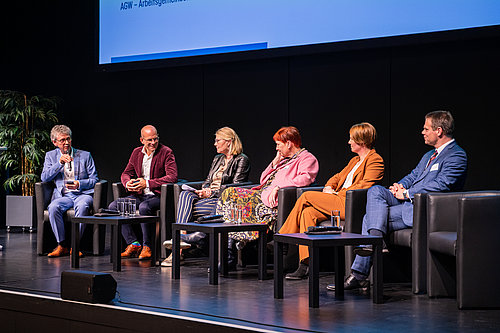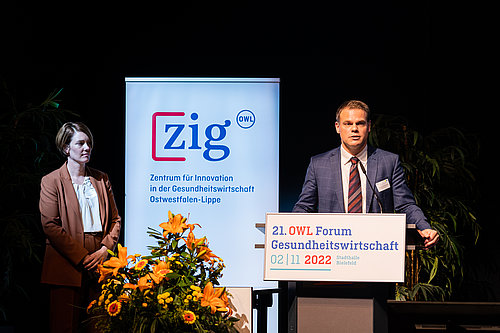More care, more personal responsibility: the future of care is also about innovative healthcare in the region
Shaping care is one of the biggest social tasks of the coming years. The number of people in need of care is rising, and at the same time the shortage of skilled nursing staff is also increasing. This development has been worrying experts for some time. But what do citizens have to say about the care of the future? Over the past few weeks, 1,500 Bielefeld citizens have taken part in the survey "Future Nursing". The results have now been presented by the initiators. Numerous ideas and suggestions were put forward as to what the care of the future should look like in practical terms. Prof. Dr. Ingo Ballschmieter, scientific director of Open Innovation City, was impressed: "The response, but above all the high level of commitment of the participants, who made many creative and solution-oriented suggestions, shows how high the willingness of the urban society is to actively shape and advance the topic of care locally. We will make use of this potential and invite people to a direct exchange in the near future." The survey will be followed by citizen dialogs in Bielefeld's districts. The first events are scheduled to start in the first quarter of 2023.
Making good care even more visible, strengthening people's health literacy
Dr. Charlotte Sahin, project manager at ZIG OWL, presented the individual results of the survey. Many of the results coincide with other research findings, but the findings of the citizens' survey particularly highlight the need for action for the city of Bielefeld. For example, the majority of respondents are obviously satisfied with the care services on offer. The problem: For almost half of the respondents, the existing offers for care and health promotion are not known. "Here we urgently need to work on improving their visibility. Particularly in the digital area, we have already developed some good solutions, but obviously too few people know about them," suspects Ingo Nürnberger, head of the department for social affairs and integration and first councillor of the city of Bielefeld. According to the survey, people in the city are also very open to new technologies. Almost three-quarters of those surveyed think it's a good thing if caregivers have more time for care thanks to digital applications. Almost half of those surveyed appreciate the possibility of maintaining contact with relatives through digital media. Regardless, respondents almost universally agree on one point: technology can only support and supplement caregivers, not supplant them (83%). Almost 40% of respondents attach great importance to well-trained caregivers with sufficient time capacities, a demand that goes hand in hand with the desire for self-determination (66%) and a stay in one's own home for as long as possible (32%). Here, too, the respondents' answers provide important impetus. Thus, for many, innovative housing offers such as apartment buildings or care shared flats, supplemented by centrally located and low-threshold information and advice centers, are quite possible future scenarios. "However, such models only work if the living situation, social interaction and professional care are well coordinated and we go directly into the neighborhoods with our care services," explains Pastor Dr. Johanna Will-Armstrong, member of the Board of the v. Bodelschwingsche Stiftungen Bethel.

OWL as in pioneering role for more patient orientation and better participation in the healthcare system.
With the direct participation of the urban society in questions concerning the further development of the care system, the initiative "Zukunftsbild Pflege" has set an important impulse. An exemplary action, for which Stefan Schwartze, member of the German Bundestag and Federal Government Commissioner for Patients' Affairs, had words of praise in his keynote speech preceding the presentation: "In an increasingly complex healthcare system that is growing from year to year, it is becoming more and more difficult for individuals to find their way around, especially as they are assigned more and more personal responsibility. That's why we need the responsible patient to actively engage in the process with our support. The citizen survey ties in seamlessly with this idea." In any case, he sees the East Westphalia-Lippe region in a pioneering role when it comes to testing new and forward-looking concepts for the healthcare industry. The patient lottery tickets, which have been in use in the region for years, are good examples of this, as are the health kiosks that recently went into operation in Hörstmar and Loxten. Both approaches are forward-looking, he says, because they not only strengthen the health competence of individuals, but also appeal to their personal responsibility when it comes to health care - and that is precisely where the patient-oriented health care system needs to get to.
New care models: existing structures are not enough
But are such reform approaches enough to get a grip on the current difficult situation? From the point of view of Dr. Ulli Polenz, a doctor in private practice in Paderborn-Wewer for almost 40 years and one of the experts who addressed this question in the concluding panel discussion, rather not. "Of course, these formats are important as a supplement to the existing system, but they cannot replace it. We have to keep an eye on primary care and see that we get a grip on the structural problems that arise here." For Günter Hölling of the patient center at Gesundheitsladen Bielefeld e.V., it is not so much the lack of information that is currently complicating the situation anyway, but rather the problems that often arise in using them. "Often, calling the hotline or doing a web search on Google doesn't help those affected. They need rather the consultation locally, which explains to them, how they use and use the information." Anja Rethmeier-Hanke, staff unit Medical Control and Development at Klinikum Lippe, which helps run the Hörstmar health kiosk, is also primarily concerned in her work with rebuilding the health literacy of individuals, "which has already declined dramatically in recent years." However, at least on one point, formulated by Dr. Michael Brinkmeier, Chairman of the Board of the German Stroke Foundation in Gütersloh, all the participants in the discussion agreed: "Ultimately, it is always a matter of gaining the trust of the people we are caring for. Only if we succeed in doing that does our work have a chance of success." The partners in the initiative "Future Care Model", which includes ZIG OWL (ZIG) and the Open Innovation City research project, as well as the city of Bielefeld, the v. Bodelschwinghschen Stiftungen Bethel and the Arbeitsgemeinschafft Bielefelder Wohlfahrtsverbände (Bielefeld Welfare Associations Working Group), are also counting on trusting cooperation. The initiative wants to continue the discussion that has already begun and will be inviting people to the citizens' forums in the city districts from January 2023.







